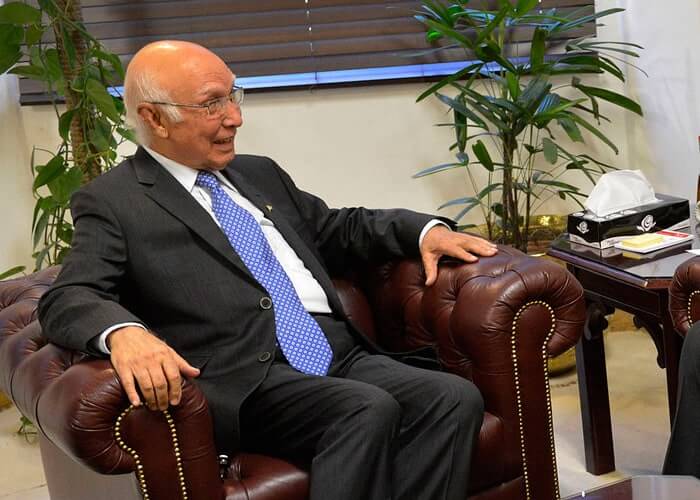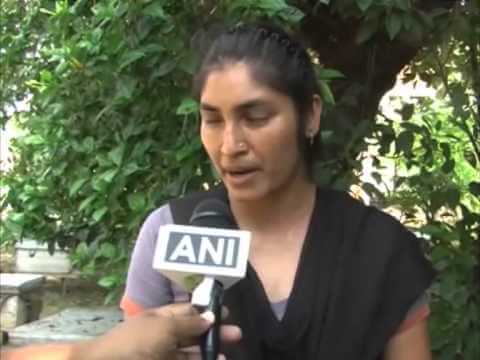Newsblaze Monitoring Desk
Pakistan National Security and Foreign Affairs Adviser, Sartaj Aziz, speaking in Islamabad, says he is disappointed the Indian government has cancelled talks planned for next week. The reason for that meeting, according to Mr. Aziz, was “to reduce tensions on the Line of Control and restore trust by addressing each others’ concerns regarding terrorist activities.”
Mr. Aziz says India has accused Pakistan of trying the distort the agreed agenda, but he says that is not true.
Sartaj Aziz and his Indian counterpart, Ajit Doval were to meet in New Delhi on Sunday.
Earlier this week, NewsBlaze reported that the NSA-level talks between India and Pakistan would go ahead as scheduled, even though the Pakistani High Commission invited Kashmiri separatist leaders to meet Mr. Aziz.
At that time, India was considering what to do about that, and now it is known that India has called off the talks, just as it did last year, India called off Foreign Secretary-level talks after the Pakistan High Commissioner met Kashmiri separatist leaders on the eve of the FS-level meeting.
Pakistan Wants To Discuss Kashmir
Here is what Aziz said in the press conference in Islamabad :
I am very disappointed that India has virtually cancelled the first ever official talks between the National Security Advisers scheduled for 24 August. On 17 August last year, India had unilaterally cancelled the talks between the two Foreign Secretaries scheduled for 25 August 2014, in Islamabad. The reason for this regretful second cancellation if it is happening, would be the same: Why did the Pakistan High Commission invite 3 or 4 leaders from the Indian Occupied Kashmir to a reception organized in New Delhi on 23 August to enable me to meet a cross section of Indian political and business leaders.
I expect that global think tanks and foreign policy experts will carefully ponder over this important question: Is it conceivable that a country like India will cancel the first ministerial interaction between the two countries since Mr. Modi’s take over, on such flimsy grounds, especially when the main purpose of the meeting was to reduce tensions on the Line of Control and restore trust by addressing each others concerns regarding terrorist activities sitting across the table rather than through the media.
Even more ironic is their alibi that Pakistan was trying to distort the agenda agreed at Ufa and was imposing new conditions for the talks. Nothing could be farther from the truth.
The three point agenda proposed by Pakistan was fully in line with the Ufa statement. The first point called for discussion on all issues related to terrorism.
The second point calls for reviewing progress on actual decisions made at Ufa i.e. prompt release of fishermen, better arrangements for religious tourism, and activation of mechanisms for restoring peace across the LOC and the Working Boundary.
The third point was intended to explore the modalities for discussions on all other outstanding issues including Kashmir, Sir Creek and Siachen.
India seems reluctant to recognize the significance of the most important sentence in the Ufa Statement: India and Pakistan have a collective responsibility to ensure peace and promote development. To do so, they are prepared to discuss all outstanding issues. The word K is very much present in this sentence because everyone knows that the most important outstanding issue between the two countries is the future of Jammu and Kashmir in accordance with the UN resolutions.
The statement of the Official Spokesperson of the Indian External Affairs Ministry that Pakistan has imposed new conditions totally ignores the last sentence of the note handed over to the Indian High Commission on 21 August that Pakistan is ready to hold NSA talks without any preconditions. In fact it was India which introduced a new condition through its advice that Pakistan should not meet Hurriyat leaders, thus assuming the right to determine the guest list for the High Commissioners reception.
The most hilarious part of the statement of the official Spokesperson of External Affairs Ministry is the sentence.The people of both countries can legitimately ask today what is the force that compels Pakistan to disregard the agreements reached by two elected leaders and sabotage their implementation.
The wishful narrative in the statement wants everyone to believe that only Pakistan’s military establishment is pushing the agenda towards the Kashmir issue. It is surprising that the Indian foreign policy establishment with all its expertise, has not recognized the stark reality that in Pakistan not only the political leadership but the entire nation is fully committed to provide political, moral and diplomatic support to the Kashmiris struggling for their right of self-determination.
As always, India has been conducting a part of its diplomacy through the Indian media. A major theme being played up in the Indian media is that Pakistan was apprehensive of the dossier Mr. Doval prepared for presentation to me during the NSA talks and was therefore looking for an exit. In fact I will also be carrying three dossiers on RAWs involvement in promoting terrorism in Pakistan. If I do not get this opportunity on 24 August, I hope I will get a chance to hand them over to Mr. Doval in New York next month, if he accompanies Prime Minister Modi for the UN General Assembly. After handing over these dossiers to Mr. Doval, I can then also share them with the UN Secretary General.
Meanwhile I can only urge Mr. Modi to ponder over the most important part of the Ufa Statement (that India and Pakistan have a collective responsibility to ensure peace and promote development. To do so, they are prepared to discuss all outstanding issues) and think of ways and means of initiating serious dialogue on these outstanding issues.
On my part, I am still prepared to go to New Delhi for NSA talks without any preconditions.
Sartaj Aziz is Adviser to Pakistan’s Prime Minister on National Security and Foreign Affairs.





